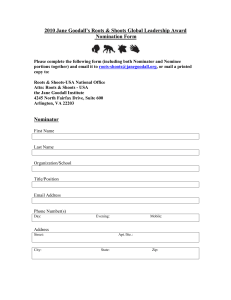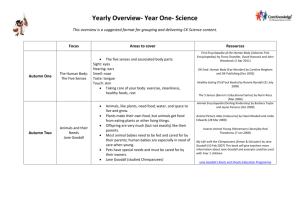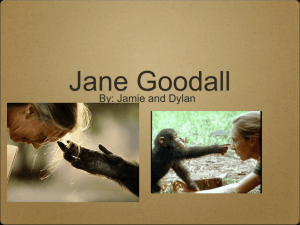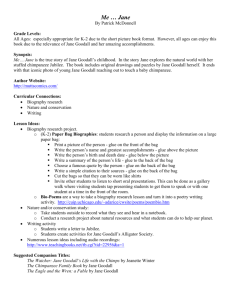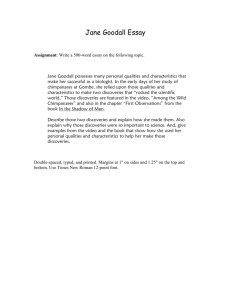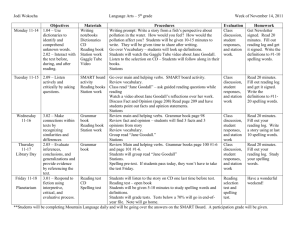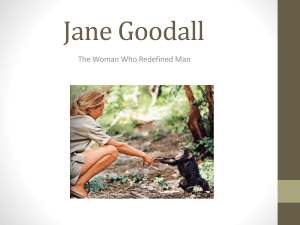Jane Goodall Biography
advertisement
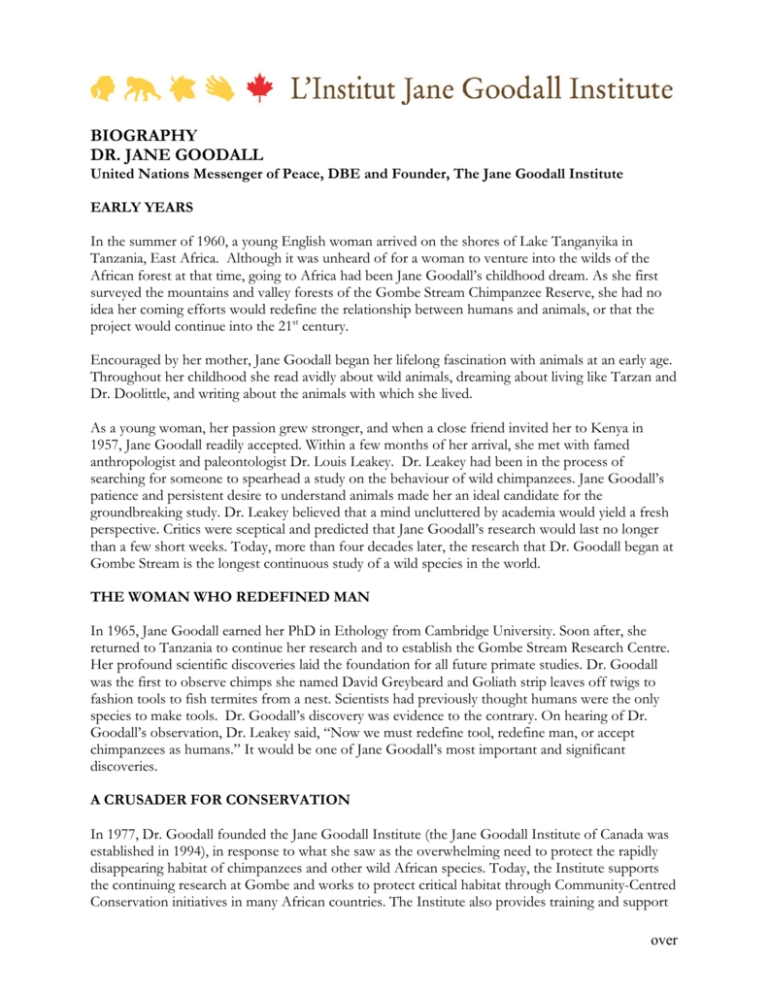
BIOGRAPHY DR. JANE GOODALL United Nations Messenger of Peace, DBE and Founder, The Jane Goodall Institute EARLY YEARS In the summer of 1960, a young English woman arrived on the shores of Lake Tanganyika in Tanzania, East Africa. Although it was unheard of for a woman to venture into the wilds of the African forest at that time, going to Africa had been Jane Goodall’s childhood dream. As she first surveyed the mountains and valley forests of the Gombe Stream Chimpanzee Reserve, she had no idea her coming efforts would redefine the relationship between humans and animals, or that the project would continue into the 21st century. Encouraged by her mother, Jane Goodall began her lifelong fascination with animals at an early age. Throughout her childhood she read avidly about wild animals, dreaming about living like Tarzan and Dr. Doolittle, and writing about the animals with which she lived. As a young woman, her passion grew stronger, and when a close friend invited her to Kenya in 1957, Jane Goodall readily accepted. Within a few months of her arrival, she met with famed anthropologist and paleontologist Dr. Louis Leakey. Dr. Leakey had been in the process of searching for someone to spearhead a study on the behaviour of wild chimpanzees. Jane Goodall’s patience and persistent desire to understand animals made her an ideal candidate for the groundbreaking study. Dr. Leakey believed that a mind uncluttered by academia would yield a fresh perspective. Critics were sceptical and predicted that Jane Goodall’s research would last no longer than a few short weeks. Today, more than four decades later, the research that Dr. Goodall began at Gombe Stream is the longest continuous study of a wild species in the world. THE WOMAN WHO REDEFINED MAN In 1965, Jane Goodall earned her PhD in Ethology from Cambridge University. Soon after, she returned to Tanzania to continue her research and to establish the Gombe Stream Research Centre. Her profound scientific discoveries laid the foundation for all future primate studies. Dr. Goodall was the first to observe chimps she named David Greybeard and Goliath strip leaves off twigs to fashion tools to fish termites from a nest. Scientists had previously thought humans were the only species to make tools. Dr. Goodall’s discovery was evidence to the contrary. On hearing of Dr. Goodall’s observation, Dr. Leakey said, “Now we must redefine tool, redefine man, or accept chimpanzees as humans.” It would be one of Jane Goodall’s most important and significant discoveries. A CRUSADER FOR CONSERVATION In 1977, Dr. Goodall founded the Jane Goodall Institute (the Jane Goodall Institute of Canada was established in 1994), in response to what she saw as the overwhelming need to protect the rapidly disappearing habitat of chimpanzees and other wild African species. Today, the Institute supports the continuing research at Gombe and works to protect critical habitat through Community-Centred Conservation initiatives in many African countries. The Institute also provides training and support over for environmental and humanitarian education and action, primarily through its global education program, Roots & Shoots. Dr. Goodall spends more than 300 days each year travelling the world and speaking to groups about her messages of hope for the future, and encouraging young people to make a difference in their world. AWARDS AND ACHIEVEMENTS: As the recipient of numerous awards, Jane Goodall is world-renowned and highly respected in both the scientific and lay communities. Highlights include: • In 1995, Jane Goodall received the National Geographic Society’s prestigious Hubbard Medal “for her extraordinary study of wild chimpanzees and for tirelessly defending the natural world we share.” • Dr. Goodall was the international recipient of the 1996 Caring Award and Sigma Xi’s 1996 William Proctor Prize for Scientific Achievement. • In 2002, U.N. secretary of General Kofi Annan appointed her a “Messenger of Peace” • In 2003, H.M. Queen Elizabeth II awarded her the highest honour, the title of Dame of the British Empire (DBE). • The United Nations appointed Dr. Goodall as the third recipient of the Ghandi-King Award for Non-Violence, and she received the Benjamin Franklin Medal in Life Science. • In 2006, Dr. Goodall received the French Legion of Honor • Additional honours include: the Kyoto Prize, The Ark Trust Lifetime Achievement Award, the Encyclopedia Britannica Award and the Animal Welfare Institute’s Albert Schweitzer Award. She remains the only non-Tanzanian to have received the Medal of Tanzania. ACADEMIC HONOURS: Jane Goodall has received honorary doctorates from the University of Guelph, University of Toronto and Toronto’s Ryerson University, as well as from the University of Haifa, Salisbury State University, Western Connecticut State University, the University of North Carolina, Tufts University, the University of Philadelphia, La Salle College, the University of Southern California, the University of Utrecht, Munich University, Edinburgh University, and the University of Dar Es Salaam. Most recently, Cornell University appointed Goodall as a distinguished Andrew D. White Professor-at-Large.

